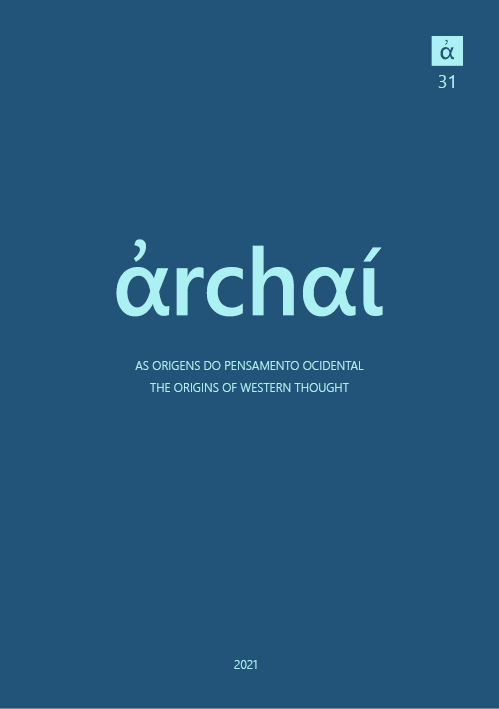Establishing the Logos of Melissus: A Note on Chapter 1, Hippocrates’ De natura hominis
DOI:
https://doi.org/10.14195/1984-249X_31_24Keywords:
Melissus, Hippocrates, Monism, EleaticsAbstract
The earliest mention of Melissus of Samos by name is found in the first chapter of the Hippocratic De natura hominis. In the following note, I attempt to examine what is meant by the reference Melissus’ ‘logos’ in this work and suggest, against previous accounts, including Galen’s, that it has little to do with his commitment to monism. Rather Melissus’ logos is better understood as his referring to his strategy for demonstrating such a conclusion, especially his use of a supplemental argument in his fragment B8. Polybus’ concern in this first chapter is not monism as such but the claims to knowledge monists make. Melissus is a prime example of a monist who fails to grasp what he claims to know.Downloads
References
BARNES, J. (1982). The Presocratic Philosophers. London, Routledge
BICKNELL, P. (1982). Melissus’ way of seeming? Phronesis 27, p. 194–201.
BURY, R.G. (1935) Sextus Empiricus. Sextus Empiricus, Against the Logicians. Cambridge, MA, Harvard University Press.
FURLEY, D. (1967) Two Studies in the Greek Atomists. Princeton, Princeton University Press.
GUTHRIE, W. K. C. (1965). A History of Greek Philosophy. Volume II. Cambridge, Cambridge University Press.
GRAHAM, D. W. (2010). The Texts of Early Greek Philosophy. Cambridge, Cambridge University Press.
HANKINSON, R. J. (1998) Cause and Explanation in Greek Thought. Oxford, Clarendon Press.
HARRIMAN, B. (2015). The Beginning of Melissus’ On Nature, or On What-is: A Reconstruction. Journal of Hellenic Studies 135, p. 19–34.
HARRIMAN, B. (2018) Melissus and Eleatic Monism. Cambridge, Cambridge University Press.
JONES, W. H. S. (1923). Hippocrates. Volume II. Cambridge, MA, Harvard University Press.
JOUANNA, J. (1965). Rapports entre Mélissos de Samos et Diogène d’Apollonie, à la lumière du traité hippocratique De natura hominis. Revue des Études Anciennes 67, p.306–23.
JOUANNA, J. (2012). The Legacy of the Hippocratic Treatise The Nature of Man: The Theory of the Four Humours. In: ALLIES, N. (ed.) Greek Medicine from Hippocrates to Galen: Selected Papers. Leiden, Brill, p. 335-360.
LONGRIGG, J. (1993). Greek Rational Medicine: Philosophy and Medicine from Alcmaeon to the Alexandrians. London, Routledge.
MAKIN, S. (2014). Parmenides, Zeno, and Melissus. In: WARREN, J.; SHEFFIELD, F. (eds.) The Routledge Companion to Ancient Philosophy. London, Routledge, p. 34–48.
MANN, J. (2012). Hippocrates, On the Art of Medicine. Leiden, Brill.
MEWALDT, J.; HELMREICH, G.; WESTENBERGER, J. (1914). Corpus Medicorum Graecorum, V. 9, 1. Galeni in Hippocratis de Natura Hominis, in Hipporatis de Victu Acutorum, de Diaeta Hippocratis in Morbis Acutis. Berlin, B.G. Teubner.
PALMER, J. (2001). A New Testimonium on Diogenes of Apollonia, with Remarks on Melissus’ Cosmology. Classical Quarterly 51, p. 7-17.
PALMER, J. (2004). Melissus and Parmenides. Oxford Studies in Ancient Philosophy 26, p. 19–54.
PALMER, J. (2009). Parmenides and Presocratic Philosophy. Oxford, Oxford University Press.
REALE, G. (1970). Melisso: Testimonianze e frammenti. Florence, La Nuova Italia.
REINHARDT, K. (1916). Parmenides und die Geschichte der griechischen Philosophie. Bonn, Friedrich Cohen.
TAYLOR, A.E. (1911). Varia Socratica. Oxford, J. Parker.
Downloads
Published
How to Cite
Issue
Section
License
Copyright (c) 2021 Benjamin Harriman

This work is licensed under a Creative Commons Attribution 4.0 International License.
Given the public access policy of the journal, the use of the published texts is free, with the obligation of recognizing the original authorship and the first publication in this journal. The authors of the published contributions are entirely and exclusively responsible for their contents.
1. The authors authorize the publication of the article in this journal.
2. The authors guarantee that the contribution is original, and take full responsibility for its content in case of impugnation by third parties.
3. The authors guarantee that the contribution is not under evaluation in another journal.
4. The authors keep the copyright and convey to the journal the right of first publication, the work being licensed under a Creative Commons Attribution License-BY.
5. The authors are allowed and stimulated to publicize and distribute their work on-line after the publication in the journal.
6. The authors of the approved works authorize the journal to distribute their content, after publication, for reproduction in content indexes, virtual libraries and similars.
7. The editors reserve the right to make adjustments to the text and to adequate the article to the editorial rules of the journal.



